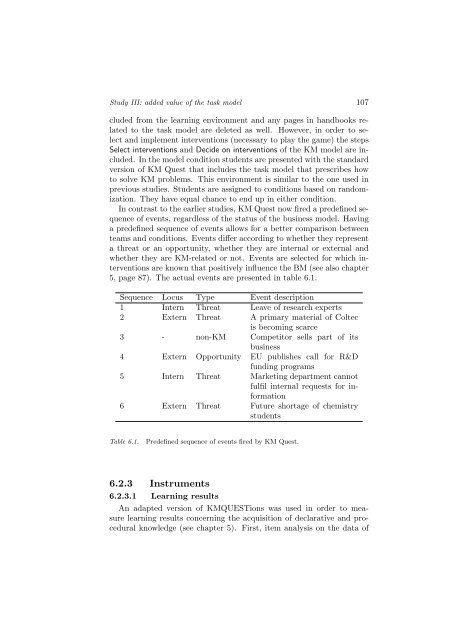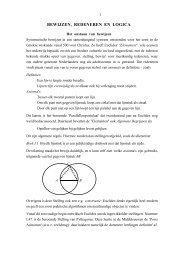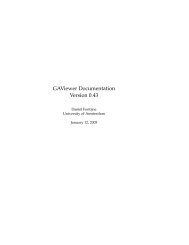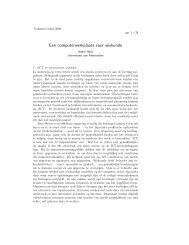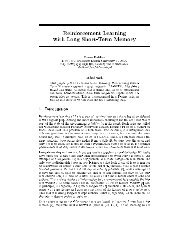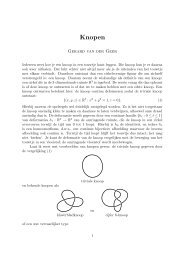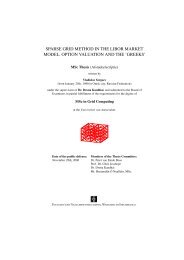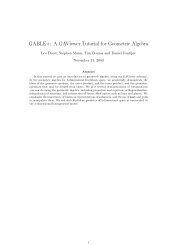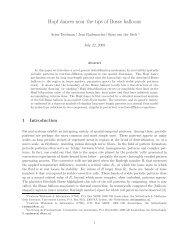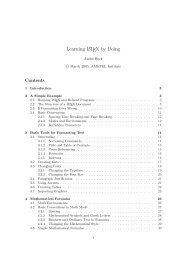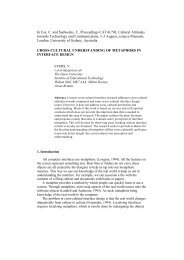The role of metacognitive skills in learning to solve problems
The role of metacognitive skills in learning to solve problems
The role of metacognitive skills in learning to solve problems
You also want an ePaper? Increase the reach of your titles
YUMPU automatically turns print PDFs into web optimized ePapers that Google loves.
Study III: added value <strong>of</strong> the task model 107<br />
cluded from the learn<strong>in</strong>g environment and any pages <strong>in</strong> handbooks related<br />
<strong>to</strong> the task model are deleted as well. However, <strong>in</strong> order <strong>to</strong> select<br />
and implement <strong>in</strong>terventions (necessary <strong>to</strong> play the game) the steps<br />
Select <strong>in</strong>terventions and Decide on <strong>in</strong>terventions <strong>of</strong> the KM model are <strong>in</strong>cluded.<br />
In the model condition students are presented with the standard<br />
version <strong>of</strong> KM Quest that <strong>in</strong>cludes the task model that prescribes how<br />
<strong>to</strong> <strong>solve</strong> KM <strong>problems</strong>. This environment is similar <strong>to</strong> the one used <strong>in</strong><br />
previous studies. Students are assigned <strong>to</strong> conditions based on randomization.<br />
<strong>The</strong>y have equal chance <strong>to</strong> end up <strong>in</strong> either condition.<br />
In contrast <strong>to</strong> the earlier studies, KM Quest now fired a predef<strong>in</strong>ed sequence<br />
<strong>of</strong> events, regardless <strong>of</strong> the status <strong>of</strong> the bus<strong>in</strong>ess model. Hav<strong>in</strong>g<br />
a predef<strong>in</strong>ed sequence <strong>of</strong> events allows for a better comparison between<br />
teams and conditions. Events differ accord<strong>in</strong>g <strong>to</strong> whether they represent<br />
a threat or an opportunity, whether they are <strong>in</strong>ternal or external and<br />
whether they are KM-related or not. Events are selected for which <strong>in</strong>terventions<br />
are known that positively <strong>in</strong>fluence the BM (see also chapter<br />
5, page 87). <strong>The</strong> actual events are presented <strong>in</strong> table 6.1.<br />
Sequence Locus Type Event description<br />
1 Intern Threat Leave <strong>of</strong> research experts<br />
2 Extern Threat A primary material <strong>of</strong> Coltec<br />
is becom<strong>in</strong>g scarce<br />
3 - non-KM Competi<strong>to</strong>r sells part <strong>of</strong> its<br />
bus<strong>in</strong>ess<br />
4 Extern Opportunity EU publishes call for R&D<br />
fund<strong>in</strong>g programs<br />
5 Intern Threat Market<strong>in</strong>g department cannot<br />
fulfil <strong>in</strong>ternal requests for <strong>in</strong>formation<br />
6 Extern Threat Future shortage <strong>of</strong> chemistry<br />
students<br />
Table 6.1.<br />
Predef<strong>in</strong>ed sequence <strong>of</strong> events fired by KM Quest.<br />
6.2.3 Instruments<br />
6.2.3.1 Learn<strong>in</strong>g results<br />
An adapted version <strong>of</strong> KMQUESTions was used <strong>in</strong> order <strong>to</strong> measure<br />
learn<strong>in</strong>g results concern<strong>in</strong>g the acquisition <strong>of</strong> declarative and procedural<br />
knowledge (see chapter 5). First, item analysis on the data <strong>of</strong>


